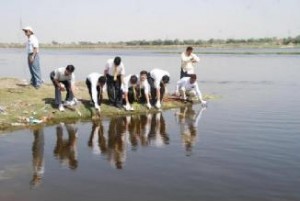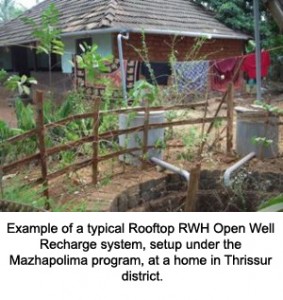/topics/governance
Governance
The Sambalpur declaration on Odisha rivers : Let the river flow
Posted on 23 Apr, 2009 12:04 PMWater Initiatives Orissa(WIO) and the Indian River Network (IRN) organsied the Odisha River Conference during 18 - 20 April 2009 at Sambalpur, Odisha. Attended by about 75 participants which included activists, environmentalists, journalists, academicians, researchers and civil society representatives from across the country, the Conference has just concluded with a "Sambalpur Declaration" that calls for saving the rivers from the current fate of high rate of degradation and giving communities their traditional rights over the rivers, among other strong resolutions.
Agra: Yamuna river trash cleanup 2009
Posted on 23 Apr, 2009 11:45 AMAhead of the Lok Sabha polls, hundreds of students of several schools along with senior citizens cleaned up Poiya Ghat Sunday morning, picking up rags and used polythene bags, to focus attention on river pollution which candidates of various political parties have chosen to ignore.
Brij Khandelwal, programme convener of the Yamuna Foundation and Rivers of the World Foundation, said apart from students involved in the My Clean Agra initiative, a large number of other voluntary groups and organisations were involved in Sunday's programme which specifically targeted the politicians for failing to clean up the cities and the rivers of India.
"No political party has bothered to say a word about how they would save a dying river and rejuvenate it or restore its original glory," said Subhash Jha and Haridutt Sharma of the Yamuna Foundation for Blue Water.
Agilent Technologies: "India Innovation Initiative - i3" competition
Posted on 20 Apr, 2009 01:59 AMThe objective of the India Innovation Initiative project is to create an innovation eco-system in the country by sensitizing, encouraging and promoting innovators and facilitating commercialization of the innovations. DST and CII jointly launched the Young Inventors initiative "Steer the Big Idea" in the year 2004. It was aimed at capturing the innovative ideas from young innovators for the benefit of Industry & society. In 2005, CII & DST joined hands with Industry to form IRIS - Initiative for Research and Innovation in Science. IRIS has been focused so far on school students i.e. innovators below the age group of 18 years. Agilent has been organizing the Agilent Engineering and Technology Awards through which it has been encouraging engineering students towards hands-on engineering in India and recognizing innovation. CII & DST have now joined hands with Agilent in a combined effort to launch a nation-wide innovation competition for all innovators above the age group of 18+: "India Innovation Initiative - i3". i3 aims to capture the innovative ideas from the Indian innovators in the age group of 18 years and above, including students, innovators from R&D Institutes & Labs, Industry professionals and individual innovators / Entrepreneurs, grassroots innovators etc. The topic for the 2009 event is "Technology Innovation for Masses and Global Impacts".
District panchayat office in Kasaragod, Kerala, uses rainwater harvesting to tap the overhead source: a case study
Posted on 16 Apr, 2009 01:07 PM"Plenty on the roof", is a case study written by Shree Padre in August 2005, of how a district panchayat office in Kerala, used rainwater harvesting not just to overcome shortages in piped supply, but to tap the overhead source, so that no other source was needed.
Recharge of deep borewells in hard rock terrain
Posted on 14 Apr, 2009 11:11 AMIndia's dependence on the underground aquifer especially deep bore wells are well known. With over 22 million wells India has perhaps one of the largest such structures in the world. Since most of peninsular India is hard rock with basalt/granite/gneiss underlying they present a particular challenge for understanding.
Right to safe drinking water: managing water for drinking
Posted on 14 Apr, 2009 10:25 AMUN committee on economic, social and cultural rights in 2002 issued a general comment on the right to water. However, provision of safe drinking water remains a challenge.
"Mazhapolima"? : Participatory well recharge programme in Thrissur district, Kerala, part 2
Posted on 13 Apr, 2009 03:35 PMThe Mazhapolima program is quite unique; it aims to (eventually) recharge about 4.5 lakh dug wells in the district, and do this through community awareness and action. It's driven by the District Collector, Mr. Kurian Baby, who strongly advocates sustainable, local development & innovation.
A Gram Panchayat (GP) in Kerala is fairly large, and has a population of approximately 20000 people, as compared to about 10000 in Karnataka, and about 700 in Uttar Pradesh. GP's have ward divisions, about 20 of them per GP. Each GP has a staff of at least 6-8 people. The GP that we visited - Adat, had about 12 employees , 4 lower division clerks, 3 upper division clerks, 1 Joint Secretary, 1 Secretary, 2 peons and 1 sweeper. Except for the peons and the sweeper, the employees are all usually SSLC-pass, but here in Adat they were mostly graduates. For salaries alone, the GP spends about Rs 1.5 lakhs per month. Adat GP executed 124 projects last year. The GP's annual budget was Rs 1.40 crores, not including NREGA funds. Out of this, Rs 40 lakhs was raised by the GP through property taxes etc. Most other parts of the country, GP budgets are only about 5 to 10 lakhs. The Adat GP office was a large 2 storeyed building. Mr Vijayan, the Joint Secretary proudly showed us their awards, which filled up an entire wall.
Arghyam hiring : Consultant - Social development
Posted on 09 Apr, 2009 12:03 PM Arghyam is looking for a dynamic individual to join our Urban Water Initiative in Bangalore as a Consultant - Social Development. Arghyam is a not-for-profit organization working in the water sector in India. Arghyam's vision is "Enough water, safe water….always and for all". Through partnerships and grants we support strategic efforts that address issues relating to equity and sustainability for all citizens. We are a small, diverse team comprising individuals who have come together sharing the same dream and passion for making a difference to the people of India. The core members have had decades of experience in running projects in the social, corporate and Government settings. Under Arghyam's Urban water Initiative we are taking up Integrated Urban Water Management (IUWM) in a pilot town in Karnataka through a collaborative and participative process. It involves working with the town and all its stakeholders to facilitate integrated management of water resources, water supplies, sanitation, storm water drainage, wastewater treatment etc in a sustainable manner. The objective is to develop a model town that manages its water in a manner that is socially, technically, environmentally, and financially sustainable.
Arghyam is looking for a dynamic individual to join our Urban Water Initiative in Bangalore as a Consultant - Social Development. Arghyam is a not-for-profit organization working in the water sector in India. Arghyam's vision is "Enough water, safe water….always and for all". Through partnerships and grants we support strategic efforts that address issues relating to equity and sustainability for all citizens. We are a small, diverse team comprising individuals who have come together sharing the same dream and passion for making a difference to the people of India. The core members have had decades of experience in running projects in the social, corporate and Government settings. Under Arghyam's Urban water Initiative we are taking up Integrated Urban Water Management (IUWM) in a pilot town in Karnataka through a collaborative and participative process. It involves working with the town and all its stakeholders to facilitate integrated management of water resources, water supplies, sanitation, storm water drainage, wastewater treatment etc in a sustainable manner. The objective is to develop a model town that manages its water in a manner that is socially, technically, environmentally, and financially sustainable.
Rooftop rainwater harvesting in Gujarat by Utthan
Posted on 08 Apr, 2009 01:16 PMI was in Bhavnagar - Saurashtra, Gujarat and came across rooftop rainwater harvesting works implemented by (one more than 10 years ago) by Utthan with financial assistance from WASMO, along the same lines as what SACHETANA is attempting . These have strongly withstood the test of time and ALL of the rooftop rainwater tanks I saw (more than 120) were functioning and people were using this water exclusively for drinking and cooking. Here is a proof of concept idea which has withstood the test of time and which is ripe to be taken to areas of high fluoride and arsenic as one possible solution. Even in Gujarat this has unfortunately not happened in the fluoride affected areas at a scale which would benefit people.
Ecosan in Gujarat: Initiatives & users
Posted on 07 Apr, 2009 11:14 AMA member of the PLC Watsan group Dhani behn, has built an Ecosan toilet for herself - one of the first in Gujarat-about a year back. This is one of the best toilets on Ecosan I have seen and the simple and elegant story of the same is hugely impressive. It is located in Bhavnagar Saurashtra - Gujarat. She was part of an exposure visit of PLC WatSan to a MYRADA project in Karnataka implementing ecosan. She has one simple reason for use of the toilet- it's less use of water. Even with a twin pit pour flush about 5 litres of water gets used for a single flush and in a day 20 to 25 litres of water can get flushed by one person. Even this is too much in arid and semi arid Gujarat. The transfer of knowledge has resulted in an elegant solution to an otherwise vexing issue that can be made applicable on a larger scale across the state. There exists tremendous interest in Eco-san from other parts of Gujarat too including the coast with its high and saline water table and the tribal hamlets with its hard rock terrain and the rest with a lot of water shortage.








